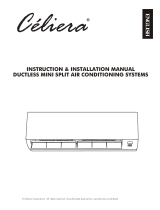
10
Using the Wireless Remote Control Unit (continued)
Address Settings
When mounting the
wireless remote control
unit on a wall for use
• Before mounting the wireless remote control unit on the wall, place the unit at the mounting
position, press the ON/OFF operation button and check that the signals are received
properly.
• To remove the wireless remote control unit, disengage it by pulling it toward you.
Operating tips • Do not operate the wireless remote control unit too far away from the signal receiver.
Doing so may cause operational errors.
Make absolutely sure that the wireless remote control unit and signal receiver are both in
the same room.
• When operating the wireless remote control unit, point it directly at the signal
receiver.
A beep is heard when a signal is received properly.
• Avoid places where the wireless remote control unit will be obscured by curtains, etc.
Remove it before operation.
When a multiple number of indoor units that can be operated by the wireless remote control unit
have been installed in the same room with a multi-unit or single-unit installation, this button enables
addresses to be set in order to prevent the sending of signals to the wrong indoor unit. Each of up to
six indoor units can be controlled separately using its own wireless remote control unit by matching
the number of the address switch on the operation area of the indoor unit and the number used for
the address of its wireless remote control unit. (The indoor units cannot be controlled separately
when they are used in a flexible combination format, simultaneous operation of multi units format or
any other such format since they will all operate at the same time.)
The signal receiver has an address switch for signal reception, and the wireless remote control unit
has an address switch for signal transmission.
How to check the
addresses
When the ADDRESS button on the wireless remote control unit is pressed, the current address
appears on the wireless remote control unit’s display. The buzzer sounds if the address
displayed matches the signal receiver’s address. (The buzzer always sounds if “ALL” appears
as the address display.)
If “ALL” appears as the address display, operations can be performed irrespective of the signal
receiver’s address. Point the wireless remote control unit at the signal receiver of the unit to be
operated, and send the signal.
How to set the matching
address
Wireless remote control unit’s address setting
1. When the ADDRESS button is held down for 4 or more seconds, “ ” lights on the
wireless remote control unit’s display, and the current address blinks.
2. Each time the ADDRESS button is now pressed, the address changes by one setting in the
following sequence: ALL → 1 → 2 → 3 ... → 6 → ALL.
Select the setting which matches the setting of the address switch in the operation area of
the indoor unit to be operated.
3. When the SET button is now pressed, the address stops blinking and lights instead, and it
remains on the display for 5 seconds.
The buzzer sounds if the setting matches the setting of the address switch in the operation
area of the indoor unit.
When the batteries are replaced, the address setting returns to “ALL”.
Secure the installation fitting of the wireless
remote control unit using the screws.
Press.
1
2
Place here.
Installation fitting of wireless remote control unit
Procedure for installing the
wireless remote control unit
NOTE
OI-837-10-EG





















